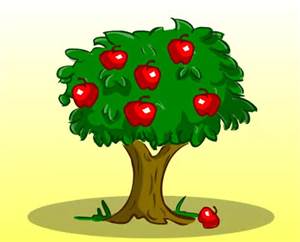When the Apple Does Fall
by Rabbi Mordechai Rhine
Lot, the beloved nephew of Avraham, had severed ties. At first he just flirted with the wicked city of Sedom. He set up his tents in such a way that the  edge of his camp neighbored with theirs. But soon he saw their fertile lands and their permissive ways, and he moved in with them. Eventually he began to join their ideology.
edge of his camp neighbored with theirs. But soon he saw their fertile lands and their permissive ways, and he moved in with them. Eventually he began to join their ideology.
He married a Sedomite woman. When he brings home guests she tells the neighbors on him.
He cuts ties with Avraham. After Sedom is destroyed, Lot’s daughters don’t even realize that they have a righteous uncle, Avraham, to whom they can turn to for help.
Lot is appointed as a “judge” in Sedom. In this capacity he is responsible to uphold its laws, including the “no guests policy.”
One wonders then, why when he does encounter travelers, does he offer them hospitality? In fact when the travelers decline his offer, Lot insists. Why is Lot insisting? Didn’t he consciously choose the self-centered lifestyle of Sedom?
The commentaries explain that Lot’s behavior can be understood based on the principle called: Girsa D’Yankusa- The study of one’s youth.
Lot spent some 40 years with Avraham witnessing hospitality. Even after he left Avraham, hospitality was so ingrained in him that he couldn’t act differently. Lot was virtually compelled by his experiences with Avraham. Even as he wants to uphold the law of Sedom he can’t resist offering hospitality because it is so implanted within him.
The lesson of Lot’s story provides a great lesson to the field of parenting. “The study of one’s youth,” plays an enormous role in a child’s behavior later on in life. Even if a child chooses to chart out a different type of life than his or her parents, things that were properly role modeled and ingrained in the child will rarely be forgotten.
A child who witnessed great personal integrity will find it difficult to act in a way that is less than honest.
A child who experienced a reverence for mentors will retain a respect for mentors (including his own parents) no matter how far he or she may stray.
A child who grew up in a house of hospitality will find a natural predisposition to doing kindness even if the environment in which he is does not value such behavior.
Many parents live with the mistaken perspective that their children will be children forever. Little do they realize that the “apple of their eye” will one day move on to discover a life of their own.
Lucky is the person who realizes that one day the apple will fall.
© 2015 by TEACH613™
Lucky is the person who parents in a way that the apple will not fall far from the tree.


Sometimes the apple rolls a little bit, though. Even if you are a good tree.
RMR> true, indeed.
May they roll in a wonderful direction!
Thanks so much; just lovely
I LOVED this dvar Torah!!! Thank you so much!!!
– Tami
rabbi
can I ask who says this concept of G’irsu D’Yankusa?
great vort
RMR> I think it is a blend of Divrei Torah that I heard in yeshiva from my Rabbeim. Best!
I was just learning the sugya on Chanukah—Shabbos 21b
And bingo—this wording is in the gemara—see Abeye— towards the top—as he was not m’kabel a certain limud and then later he was m’kabal. And he said it would have been better had I learned it in my youth— Girsa D’yanukasa…